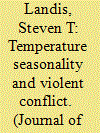|
|
|
Sort Order |
|
|
|
Items / Page
|
|
|
|
|
|
|
| Srl | Item |
| 1 |
ID:
137707


|
|
|
|
|
| Summary/Abstract |
Trade volatility can do serious harm to a country's economic and political stability. Research suggests that international trade agreements can reduce such volatility by reinforcing extant trade commitments, improving transparency, promoting policy convergence, and strengthening investor confidence. Drawing on this logic, we posit that international political ties can also produce notable reductions in export volatility. Specifically, we argue that diplomatic missions and military alliances signal lower discount rates, increase political transparency, and enhance issue linkages among trading partners. These enhancements in turn work to stabilize trade flows. To test this argument, we use a gravity model to evaluate the effects of directed diplomatic relations and alliances on bilateral export volatility. Controlling for confounding variables and exploring a wide array of model specifications, we find that the establishment of diplomatic relations or alliances can significantly reduce trade volatility.
|
|
|
|
|
|
|
|
|
|
|
|
|
|
|
|
| 2 |
ID:
134153


|
|
|
|
|
| Publication |
2014.
|
| Summary/Abstract |
Current climate change research suggests that certain seasonal weather patterns will be extended and others attenuated as global temperature increases. This is important because seasonal temperature change affects both the scarcity of resources during certain times of the year and the overall mobility of people living in countries that have seasonality. Consequently, these seasonal changes have implications for the onset of violent conflict, particularly as it relates to distinguishing when, where, and how it is most likely to occur. This article evaluates the relationship between monthly temperature changes, civil war onset, and various, less-organized conflict events, offering theoretical expectations for how seasonal changes and climate aberrations are related to an increased risk of violence. The results show that prolonged periods of stable, warm weather are consistently associated with an increased risk of civil war onset and non-state conflict. These findings are best explained through the strategic viability mechanism of temperature change, which allows actors to resolve their collective action problems that are often associated with poor weather conditions, while simultaneously increasing their strategic and behavioral incentives for engaging in violent conflict. Warm weather generates more resources for rebel looting and permits predictability for coordinating troop movements and strategy development. These findings are particularly salient in areas of the world affected by strong seasonality, where prolonged extensions of warm weather conditions would be regarded as both peculiar and attractive for participating in violent action. Although these findings are notable, even under the most extreme climate change scenarios, the substantive effects for these relationships are comparatively minor relative to other well-known intrastate Conflict Covariates.
|
|
|
|
|
|
|
|
|
|
|
|
|
|
|
|
|
|
|
|
|